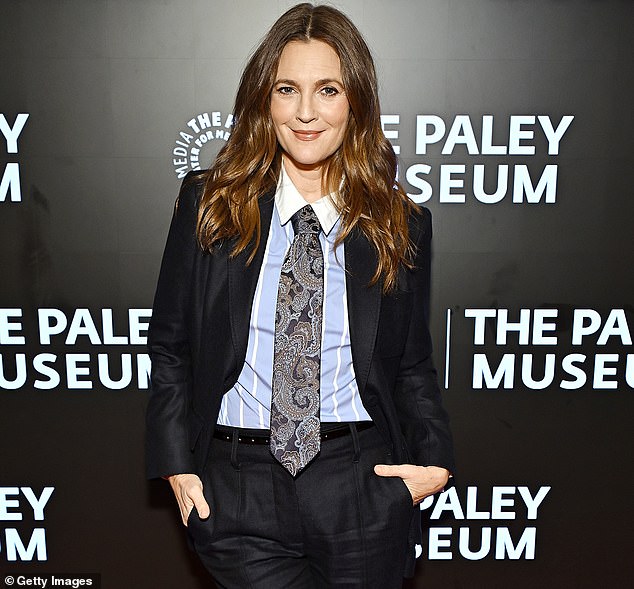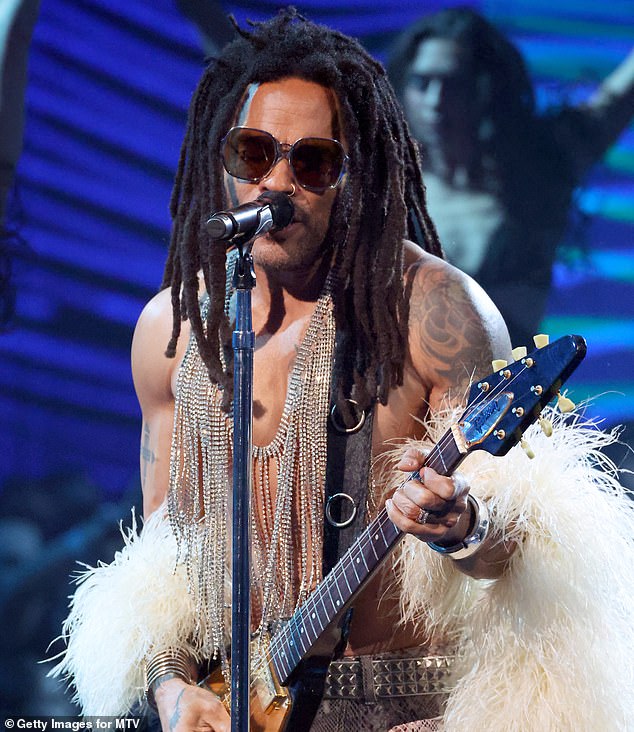From Meagan Good to Lenny Kravitz: Here’s Why Celebrities Live Celibate and the Health Benefits of the Lifestyle
More and more Americans are following the lead of celebrities and abstaining from sex in hopes of improving their mental and physical health.
Famous actors Julia Fox, Drew Barrymore, Meagan Good, Orlando Bloom and Lenny Kravitz have all tried celibacy and raved about the benefits.
Health experts told DailyMail.com that taking a break from dating for a while can be good for your career, focus and mental health, but going without sex or masturbating for an extended period of time can lead to significant health problems.
For example, studies have shown that the risk of cancer and premature death from all causes is higher in people who do not have orgasms. Meanwhile, celibacy has also been linked to heart problems.
Uncut Gems star Julia Fox said she ‘cut men out of her life’ as a way to empower herself
Yet Julia Fox, star of 2019’s Uncut Gems who dated Kanye West, said she hadn’t had sex in two and a half years this year and that things had “never been better for her.”
Barrymore has been candid about her decision to live a celibate life following her divorce in 2016, which allowed her “the pleasure of working on myself and learning what parenting is all about.”
Musician Lenny Kravitz announced this year that he has been celibate for nine years and that he plans to continue doing so until he meets the right person. “It’s a spiritual thing,” Kravitz said.
And actress Meagan Good decided to give celibacy a try after filming Jumping the Broom (2011).
She broke that promise in 2012, when she married the film’s director, DeVon Franklin.
She said: ‘If you take that out of the equation, you actually get to know the person on every level except the physical level, and that comes later.’
In the US, celibacy has become a common practice, with an estimated one in six women and one in ten men taking a break from sex and dating.
Their reasons are diverse: they want to hold on to their religious beliefs, protect themselves from sexually transmitted diseases, pursue their career goals, or recover from trauma.
This trend stems from the fact that casual sex has been declining for years.

And actress Meagan Good decided to give celibacy a try after filming Jumping the Broom (2011) until she got married a year later

Actress and talk show host Drew Barrymore lived a celibate life following the end of her marriage in 2016 to better cope with becoming a single parent.
Research has shown that celibacy improves some people’s focus on their career goals and schoolwork, free them from thinking about their next sexual encounter.
It can also Improve self-care by helping them prioritize their needs And personal development without worrying about a partner.
Abby Wilson, a licensed therapist from Texas who specializes in relationships and trauma, told DailyMail.com: ‘I think there’s value in taking a step back from something and turning the energy inward. Or building a solid foundation, like a stronger sense of self-worth and understanding yourself on a deeper level. Also understanding what gives meaning and fulfillment to your life outside of romance or sexual relationships.’
A 2017 report found that the percentage of adults ages 20 to 24 who had abstained from sex in the previous year rose from just under 12 percent from 2000 to 2009 to more than 15 percent from 2010 to 2014.
A 2020 study then found that the number of sexually inactive men between the ages of 18 and 24 rose from about 19 percent in 2000 to 2002. up to almost 31 percent from 2016 to 2018, while the percentage for young women increased from 15 percent to 19 percent.
However, there are also disadvantages to completely giving up sex.
Celibacy can lead to some atrophy of the pelvic floor muscles and the genitals, such as the clitoris. These organs can shrink and become numb.
Sex is also good for your heart. Raising your heart rate during sex to 140 to 160 beats per minute is the equivalent of running a mile in 20 minutes and walking up two flights of stairs.
The large Massachusetts Male Aging Study found that men who have sex twice a week have a lower risk of cardiovascular disease than men who have fewer problems.
It also relieves stress and anxiety by releasing oxytocin, a feel-good hormone, and dopamine, the brain’s reward chemical, while lowering levels of cortisol and adrenaline (stress hormones).
Researchers in Switzerland surveyed 370 women about how often they masturbated and their reasons for doing so: 64 percent said they masturbated to relax, 55 percent said it brought on joy, and 12 percent said they did it to relieve stress. International Journal of Sexual Health.

Lenny Kravitz revealed in 2024 that he had been celibate for nine years since his last serious romantic relationship
Sex may also protect against cancer. Harvard scientists reported in 2015 that men aged 40 to 49 who ejaculated 21 or more times per month reduced their risk of prostate cancer by 22 percent.
A new review of existing studies from 30 years ago found that men who ejaculate 21 or more times per month have a 31 percent lower risk of prostate cancer than men who ejaculate only four to seven times per month.
The celebrities who advocate celibacy have contributed to a growing movement of people who take extended breaks from intimacy for the sake of personal growth.
Olivia Reynolds explained her motivation in a video that has now been viewed by two million people. She dated casually but refrained from having sex until she entered a serious relationship that lasted about a year.
Mrs. Reynolds said: ‘I had no idea what I wanted my standards to be. But spending more time with myself, focusing on my mental and physical well-being, focusing on my goals, my ambitions, that really solidified my standards for me.
“And once I established my standards better and realized how valuable I am, my anxious attachment style disappeared.”
Meanwhile, TikTok user kingmeel93 is celibate for about six yearsand for him it is good for his mental health and protects his health.
‘Nowadays everything is so sexual, (we) skip the conversation, skip the getting to know each other, let’s just have skin-to-skin contact… and my whole thing is, STD rates are through the roof. I’m fine. I’m fine with getting my coffee. My skin is fine. I don’t need any of that.’
It has spawned an online movement called #BoySober, launched by Gen Z, in which people want to ditch dating apps, texting exes, and situationships (a contraction of a no-strings-attached sexual relationship) in order to emotionally free themselves from the trials and tribulations of the exhausting cycle of dating, obsessively checking your phone, dating more often, being ghosted, and so on.
The BoySober tag has some 30 million videos posted, mostly by women. The movement aims to break the cycle of dating and disappointment by quitting drinking altogether, much like quitting alcohol cold turkey.
